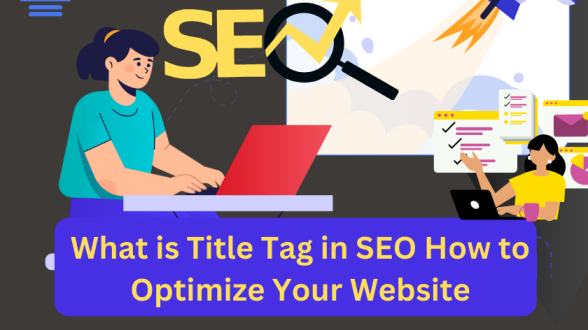Title tag is a one-page activity that you have to do. It helps search engines to understand your web page or website, what type of content is there on your website and good title tag increases the CTR of your website on search engine results pages. In this article, we will explore what title tags are, why they are important, and how to optimize them effectively.
What is a Title Tag?
The title tag is an HTML element that helps the search engine to understand the web page and when the user makes a query, it shows them the result of the query. The title tag is very important for SEO as it helps the search engine to understand what your website is about, after which the search engine ranks your website on the search engine. The better your title tag is, the better your ranking will be.
Why is Title Tag Optimization Important?
1 Search Engine Ranking: Title tags help search engines understand your website and its content, which is important for your website’s ranking. If your title tag contains relevant keywords, your website’s ranking will be better and your page is more likely to rank for those search queries.
2 User Experience: The title tag of your webpage appears on the search engine results page. When a user comes to the SERP and views your website, when your title tag is optimized in the best way, the user will click on your website, which increases the impression of your website.
3 CTR (Click-Through Rate): Higher click-through rates from SERPs can positively affect your search ranking. If more people click on your link over competitors, search engines will see your page as more relevant to the search query.
4 Branding: By adding your brand name to the title tag, you can increase brand visibility and build trust with potential customers.
Best Practices for Title Tag Optimization
To optimize your title tags effectively, follow these best practices:
1. Use Primary Keywords
It is very important to have primary keyword in your title tag which you should optimize to rank your website. SERP helps your title tag to understand the query by the user which presents your webpage to the user.
Example: If your target keyword is “best SEO tools,” your title could be:
- “Best SEO Tools for 2024 | Boost Your Rankings”
2. Keep the Title Length Between 50-60 Characters
Your title tag on search engines should be at least 50-60 characters long so that your website displays well on Google search engines. Otherwise, if your title tag is more than 50-60 characters, Google will display your title tag as blank, which will not create a good impression on Google and the user. Therefore, your title tag should be of 50-60 characters.
Example: A title tag like “How to Optimize Your Website for SEO in 2024 and Boost Your Rankings Quickly” may get cut off. Instead, shorten it to:
- “How to Optimize Your Website for SEO in 2024”
3. Place Important Keywords Early
Try to keep your primary keyword in the beginning of the title tag. Engines give more importance to the initial words of the title tag. When you keep your primary keyword in the beginning of your title tag, the chances of the user clicking on your website will increase because when a user comes to the site, the first word he reads is the starting word.
Example: Instead of writing “Top 10 Tips to Improve Your SEO Strategy in 2024,” opt for:
- “SEO Strategy Tips: Improve Your Rankings in 2024”
4. Write Unique Titles for Each Page
Every page on your website should have a unique title tag. This helps search engines understand the distinct content on each page and rank them accordingly. It also prevents duplicate content issues, which can negatively affect your SEO.
5. Use Power Words and Emotional Triggers
Power words such as “best,” “ultimate,” “guide,” or “tips” can make your title more compelling and increase CTR. Emotional triggers like “easy,” “quick,” or “essential” also attract attention and curiosity.
Example:
- “Essential SEO Tips for Quick Website Optimization”
Common Mistakes to Avoid in Title Tag Optimization
1. Keyword Stuffing
If you put a lot of overloaded keywords in your title tag in an unnatural way, then your website will not rank on Google’s search results and Google may also impose a penalty on your website. Due to which your CTR will also be low.
2. Vague Titles
Titles that are too vague or lack keywords won’t rank well in search results. Ensure your title accurately describes the page’s content while including relevant keywords.
3. Ignoring Mobile Users
More than half of web traffic comes from mobile devices. Search engines may show even fewer characters for title tags on mobile. Ensure your most important information appears within the first 50 characters for mobile users.
Read Now

